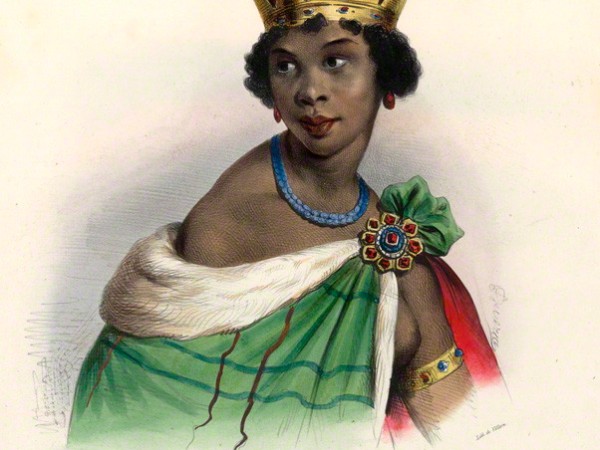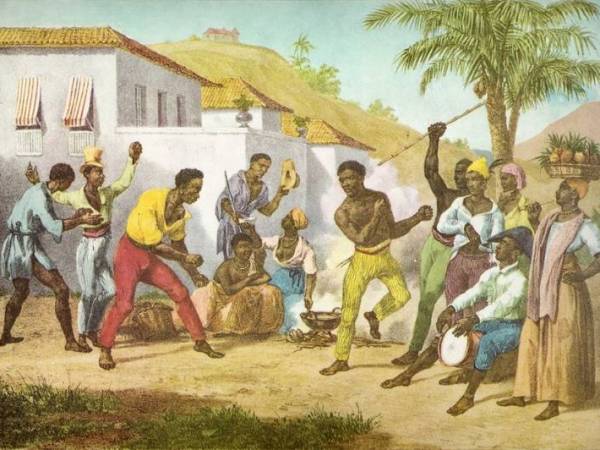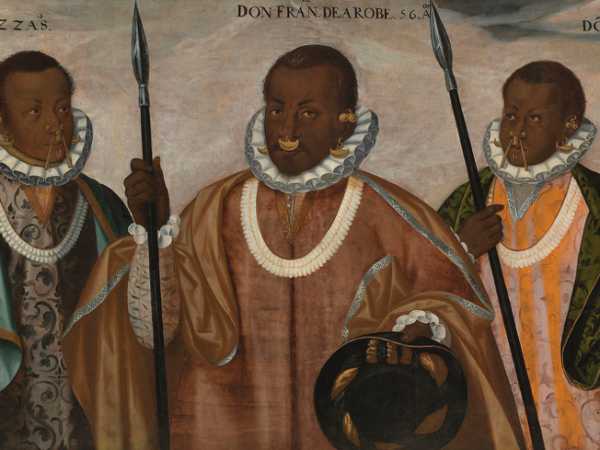An Undergraduate Research Seminar
with Chloe Ireton @ UCL History
This website has been developed for the public history project “Black Lives in the South Atlantic: West Africa, Americas, and the Caribbean in the Early Modern Era.”Members of the undergraduate research seminar led by Dr. Chloe Ireton and Dr. Michael Aidan Pope at UCL History contribute short primary source-based essays that seek to engage with the public about their ongoing research projects.
Seminar News
Public History Essays by the 2022-23 Black Atlantics Seminar Cohort
Exploring the Creolisation of Christianity in the Kingdom of the Kongo
The Kongolese Kingdom remains an anomaly in the history of Western Central Africa as the only Kingdom to see a widespread voluntary acceptance of Christianity in the early modern period. As an anomaly, it has been subject to significant historical debate. This debate has largely revolved around the purpose of Christianity within the Kongolese Kingdom, with Katie Cannon highlighting how Christianity was often introduced so that European colonial powers could cement their influence over African Kingdoms, such as the Portuguese over the Kongo.[1] However, this has been disputed by recent historiography, with John Thornton arguing that the beliefs of Christianity underwent…
Religion and Diplomacy between Europe and Africa in the Early Years of the Transatlantic Slave Trade
Since European and African kingdoms came into contact in the 15th century, religion and diplomacy were intertwined with one another. Both Africans and Europeans saw religion as a means of establishing diplomatic relations.1 To reveal the role religion played in diplomacy between Europe and Africa, this article will explore two sources. The first is Portuguese chronicler Rui de Pina’s account of a Kongolese ruler converting to Christianity in 1491. The second is a letter written by King Afonso I of Kongo to King João III of Portugal in 1526. Rui de Pina was a Portuguese chronicler who recorded events that…
Strategic confessions during the inquisition trials in 17th century Spanish America and Portuguese West Africa
The Holy Offices of the Inquisition in the seventeenth century Spanish America and Portuguese West Africa conducted inquisition trials against suspected ‘witches’ under European tropes of ‘witchcraft’.[1] In doing so, they racially persecuted groups that ‘disrupt[ed] social orders’ in their standards.[2] The inquisitors especially feared African ritual specialists for their social status and political power in Spanish America and West Africa.[3] They expected these healers to admit themselves as ‘witches’ with genuine hearts, but this did not happen in most cases. This article demonstrates how healers Paula de Eguiluz and Crispina Peres strategically used confession to retain their integrity, explaining…
Riches in West Africa: Portuguese Colonisers, English Slave Traders, and African Kings on the West African Coast in the late 16th century.
You might have wondered about the early motivations for European expeditions to the coast of West Africa that eventually resulted in the enslavement and forced displacement of some 12 million Africans across the Atlantic Ocean. Well, that is exactly what this article explores. This article analyses two primary sources: the first is an anonymous report sent to the Portuguese King, Sebastião, in September 1572 that offered four potential courses of action to increase Portuguese power on the Gold Coast. The second is the English slaver and merchant Sir John Hawkins’ account of his slave trading ventures to West Africa between…
Queen Njinga’s Diplomacy: An Exploration of Seventeenth-Century Ndongo-Portuguese Negotiations
Queen Njinga, seventeenth-century ruler of Ndongo (and later Matamba) – central African Kingdoms situated in northern Angola – is widely renowned for her masterful navigation of diplomacy and politics during a period of incredible tumult. Njinga’s letters of negotiation with Portuguese officials provide invaluable insights into the multi-faceted diplomatic strategies she exercised over her forty-year reign (1624-63). Thirty of those years were monopolised by her struggle against the Portuguese and her Ndongo rivals, who plotted to remove her from the throne. Through evaluating her letters to Captain Bento Banha Cardoso, military commander of Governor Fernão de Sousa (1626), and to…
Public History Essays by the 2020-21 Black Atlantics Seminar Cohort
Black Agency in the late sixteenth and early seventeenth century Upper Guinea: Afro Portuguese Trading Towns and African Kingship.
Whether implicitly or explicitly, popular opinion in the United Kingdom has often assumed European-African relations were antagonistic as early as 1415, with European technological advantages enabling them to forcefully control Africans and limit their agency. This idea is challenged when considering the day-to-day relations between Afro-Europeans in late sixteenth and early seventeenth century Cacheu, Guinea. The experience of Black men and women in seventeenth century Cacheu was a by-product of the sixteenth century Mane Wars. The Manes, Muslim invaders of Mandinka origin, devastated the Sape inhabited coastal regions of Africa, such as Guinea, and altered the political orientation of the…
Exploring the Legal Agency and Strategy of Enslaved Blacks in Eighteenth-Century Spanish-America.
Colonial slavery can be characterized, simply, by a slave owner’s absolute dominion over their slaves. This statement was truer of Anglo-American slavery than in Spanish-America, where enslaved Blacks possessed some legal agency independent of their owners. Hence, this blogpost explores how eighteenth-century Spain ‘enable[d] enslaved litigants [across its colonies] to access justice from the same legal institutions that simultaneously enforced the laws of property…that legitimated their enslavement’.[1] The 1783 “Complaint of Manuela, [female] Zamba Slave, That She Be Sold in Lima”, reveals that in eighteenth-century Spanish-America, slaves possessed distinct legal rights in colonial courts which they used to advocate for…
The Lives of Afro-Peruvian Women Through the Lens of Colonial Documentation
It is the work of social historians and scholars of the Iberian transatlantic slave trade to ‘capture the voice and mentalité of the colonial subaltern’, a task often attempted through the analysis of official colonial documents such as testaments, or more commonly referred to as wills.[1] Testaments were important documents during the colonial period, giving voice and platform to historical agents who otherwise would have most likely not been included in historical record, and furthermore they demonstrate interactions between people of African descent with colonial institutions and lettered culture. A ‘compendium of material and religious negotiations’, testaments can give insight into inheritance, moral…
Exploring the significance of moral introspection among the Portuguese during the operation of trans-Atlantic slavery systems
Europeans complicit in trans-Atlantic slavery systems are customarily viewed as callous individuals devoid of empathy and morality. This blogpost explores the significance of introspection among some Portuguese men in an attempt at discerning whether such monolithic presentations are justified or, as Worger posits, “not all Europeans who engaged in the early slave trade accepted without question [its] legal and moral basis.”[1] ‘The Arrival of Slaves from West Africa in Lagos’ account by Gomes Eanes de Zurara from 1444 and a 1610 letter from a Jesuit, Luis Brandaon, justifying the slave trade to a ‘sceptical colleague,’ Father Sandoval, who has attracted much…
Illuminating Free Black Agency and Legacy in Colonial Latin America
Scholars of the Black Atlantic face sources of unequal power[1] – sources where marginalized, illiterate people of African origin or decent are acknowledged and mediated by lettered, colonial culture. It is important to explore the voices and humanity of Africand and their descendents, for while they may only appear subtly in Colonial records, their contributions to the Atlantic World were no less significant than that of Europeans.[2] Allow me to present three examples of last wills to demonstrate. The first will created in 1577 belongs to Luisa de Villalobos. She declared herself a resident of city of Potosi, Bolivia…
Assessing meanings of “freedom” and “agency” in colonial Spanish America through exploring Paula de Eguiluz
An attempt to reassess definitions of “freedom” and “agency” for peoples of African descent in colonial Spanish America has been a major preoccupation of recent scholarship. People of African descent in colonial Spanish Americas existed as “imperial subjects” entitled to both a “public” and “private” life, which precipitated an ongoing “negotiation” of boundaries and hierarchies through social and cultural interactions.[1] Existing scholarship on meanings of “freedom” and “agency” are often based on the black experience of slavery in North America, leading to “freedom” usually defined vis-à-vis violence and the pursuit of manumission.[2] Superimposing these notions over the lived experiences of…
Exploring the role of religion in Afro-European relations
Throughout the fifteenth to seventeenth century, religion was intimately connected to the public policy and ambitions of European and African leaders. To illustrate the role of Christianity in Afro-European relations, I will look at two sources. The first is an extract written by Rui de Pina, a Portuguese chronicler, which details the conversion to Catholicism of Bumi Jeleen, King of Jalofo in 1488. The second is a letter from Queen Njinga of Ndongo (part of present day Angola) to the Portuguese Governor General of Angola in 1655. These sources shed light on the centrality of religion in Afro-European relations and…
Navigating the Colonial Patriarchy: 17th Century Women of African Descent
Although it is undoubtedly true that women who suffered the horrors of colonialism were particularly vulnerable to male despots, some found ways to draw on their diplomatic and judicial knowledge to make colonial societies more viable. Analysing the experiences of two women, Paula de Eguiluz, a healer tried for witchcraft in colonial Cartagena de Indias, and Queen Njinga of Ndongo, keenly illustrates that both overcame struggles with regards to legitimacy, whether that be in testament – that is, in terms of their honesty in legal proceedings – or of sovereignty. In part, the inherent duality of female sexuality enabled this…
Exploring the role of religion in Afro-European relations
Throughout the fifteenth to seventeenth century, religion was intimately connected to the public policy and ambitions of both European and African leaders. To illustrate the role of religion, notably Catholicism, in Afro-European relations, I will look at two sources. The first is an extract written by Rui de Pina, a Portuguese chronicler, which details the conversion to Catholicism of Bumi Jeleen, King of Jalofo (whom the Portuguese called Bemoym) in 1488. The second is a letter from Queen Njinga of Ndongo (former vassal state to the Kingdom of Kongo, present day Angola) to the Portuguese Governor General of Angola in…
Experiences of Freedom and the Language of Negotiation in Maroon Communities
For students of history today, it can be difficult to see slavery as anything but a binary: one is either free or enslaved, and enslaved people can do nothing to change their situation. Yet such a binary is ahistorical; for one, there existed no truly “free” Africans and African-descendants in Spanish America if such freedom is defined by a complete absence of colonial interference in their lives. Michelle McKinley suggests that ‘neither total bodily autonomy nor absolute bondage was the norm for most enslaved peoples in Lima during this period.’[1] Instead of consigning freedom to legal manumission, I argue that experiences of…
Public History Essays by the 2019-20 Black Atlantics Seminar Cohort
The Language of Diplomacy and the Paradoxical Importance of Fugitive Enslaved Subjects in the Iberian Empire, Esmeraldas (Present-day Ecuador) 1586.
If like me, at school you were only ever taught about the history of the trans-atlantic slave trade from a US or British perspective, you might be as surprised as I was to read that it was the Iberian Transatlantic Slave trade (~1500-1800) which was the most prolific in history. Slavery was, in the vast majority of cases, inhumane and violent. Imagine then, that within the landscape of European Empires in the Americas, enslaved subjects sometimes fled their captivity and formed self-sustaining societies which had relative freedom and, in some cases, were influencing political and governmental decisions. Astoundingly, this was a…
Black Maroon Societies: A ‘Safe Haven’ for the Enslaved?
Many enslaved Africans and peoples of the African diaspora fled and resisted enslavement by joining maroon societies. However, to what extent did these societies offer freedom and safety from colonialism and slavery? This blog will examine the various experiences of people living in the maroon society Palenque del Limon located near the port of Cartagena (in present-day Colombia) to argue that freedom and safety from slavery and colonialism were not universally experienced by maroons. We will use works by historians Kathryn McKnight and Jessica Krug to show how these experiences differed and depended on the status of maroons within their…
Exploring slave agency within the Trans-Atlantic
Yasmin Namoun The agency of enslaved subjects is an important area to research when studying the Atlantic world, Spanish America and the trans-Atlantic slave trade in particular – ‘their ability to fashion their lives and institutions in ways that alleviated the burdens of their situation’.[1] What forms of power did enslaved subjects have? Were they completely powerless? What forms of control did they have over their own lives? This blog post will analyse two primary sources with the purpose of helping you answer these questions. The sources: ”Don Alonso de Illescas’ Letter of Negotiation (1586)”, and a ”Petition from captain Juan Moreno…
Examining Justifications for the West African Slave Trade in 16th and early 17th Centuries
The European demand for slaves in West Africa, which peaked from 1650-1850, accentuated and increased the volume of the Atlantic slave trade. This development appears to suggest that Europeans normalised the instigation of atrocities against Africans and became immune to their inhumane practices. However, the growing availability of sources from the sixteenth and seventeenth century Iberian Atlantic world reveal some accounts of unease surrounding the enslavement of Africans and reveals how Europeans developed moral justifications to support such exploitative acts. This blog post aims to demonstrate the knowledge we can attain from these justifications, as they reveal how the Portuguese…
Examining ideas about Slavery and Freedom in the New World through legal testimonies.
How can we truly understand slavery and freedom in the New World without having access to the voices of enslaved and free blacks? This question struck me when I first approached colonial Latin America and, whilst it may initially appear daunting, it challenges us to find unique avenues to document the lives of these key historical actors. Legal testimonies by enslaved and free African descendants are a means of achieving this, and the following analysis of two testimonial collections demonstrates the invaluable insight they provide. The first records a fugitive slave’s account of their experience in the Palenque of Limón…
The use of religion to justify the trans-Atlantic slave trade
By Zahra Farooque The trans-Atlantic slave trade is often presented in popular historical representations as a picture of remorseless slave owners on the one hand and exploited enslaved peoples on the other. However, the reality is much more nuanced. It is therefore eye opening to realise that the legality of slavery was in fact questioned by Europeans in the age of the trans-Atlantic slave trade, and there was a need for the slave trade to be justified. The discourse surrounding the morality of the slave trade was mostly centred around religious principles, which were used to condone the trade. In…
Free Black Women in 18th century Peru: protecting their freedom.
Free Black Women in 18th century Peru: protecting their freedom. Peru was a viceroyalty in the Spanish empire, where enslaved subjects could be granted their legal freedom. However, the experiences of free black women in Colonial Peru were neither fixed nor monolithic. In many ways the category was contentious and everchanging, with a constant need for these women to defend and re-claim their free status. This essay explores two sources from 18th century Peru: Ana de la Calle’s testament and Maria del Carmen Ollague’s complaint against her husband,. Peru, ‘by the 17th century…had become one of the most important centres…
Colonial Catholicism: Portuguese Relations with Kongo in the 15th and 16th Centuries
In contemporary historical discourse, the legacy of the slave trade is considered as one of complete domination by the colonial powers of Europe. However, growing accessibility to sources from the early Iberian Atlantic world, particularly from the 15th and 16th centuries, is forcing a revision of established ideas about the early period of relations between Africa and Europe. In his article Early Kongo-Portuguese Relations, John Thornton considered the surprising complexity of power dynamics between the two continents; indeed, Kongolese leaders appear to have had much more control over relations with the Portuguese than first thought. This proposition is perhaps most…





